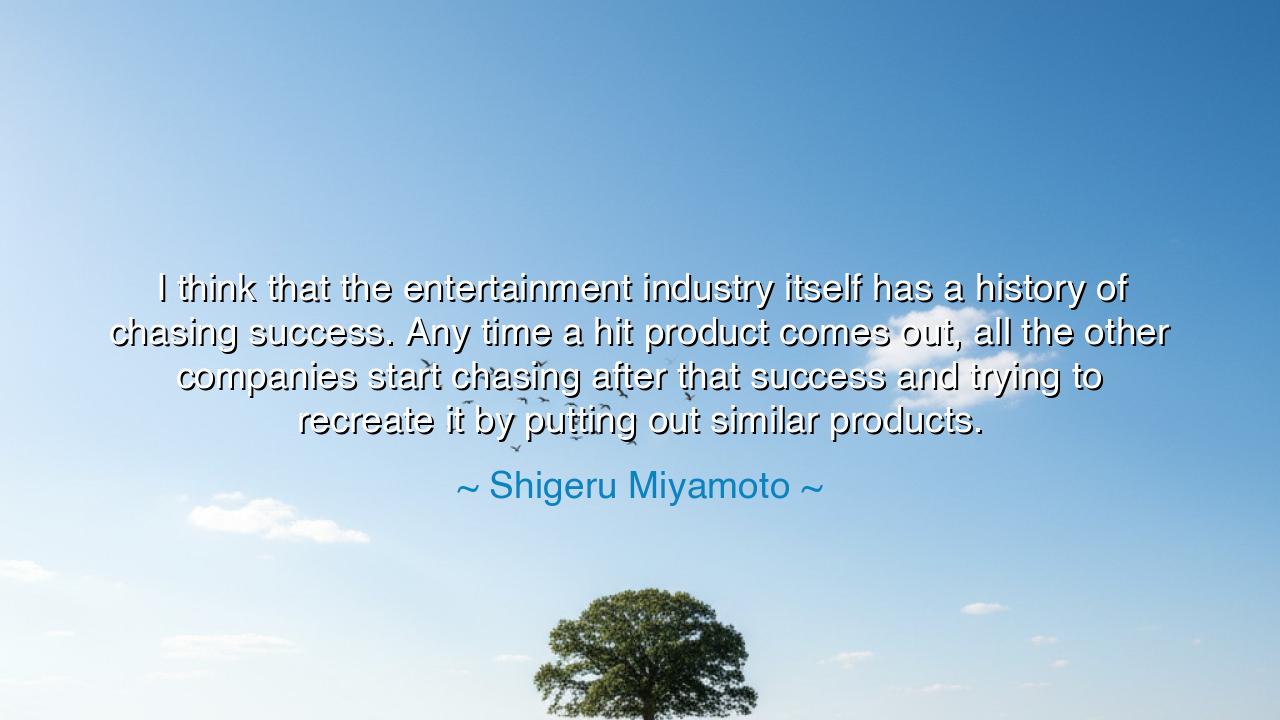
I think that the entertainment industry itself has a history of
I think that the entertainment industry itself has a history of chasing success. Any time a hit product comes out, all the other companies start chasing after that success and trying to recreate it by putting out similar products.






The master creator Shigeru Miyamoto, whose imagination gave birth to Mario, Zelda, and countless other worlds of wonder, once said: “I think that the entertainment industry itself has a history of chasing success. Any time a hit product comes out, all the other companies start chasing after that success and trying to recreate it by putting out similar products.” In these words lies not only an observation of his craft, but a deep warning to all creators: that imitation may bring profit, but it cannot bring life. True art, he reminds us, is born not from chasing others’ triumphs, but from listening to the quiet call of one’s own vision.
When Miyamoto speaks of “chasing success,” he points to the great illusion that plagues creation in every age—the belief that glory can be copied. He had seen it many times in his long journey through the realm of games: one studio births something wondrous, something that touches hearts and minds, and immediately the others follow, crafting echoes and shadows of that first light. But these copies, no matter how polished, lack the soul of the original. For success, he teaches, is not a formula—it is a spark. It cannot be found by chasing its reflection; it must be discovered in the depths of one’s own inspiration.
The origin of this insight lies in Miyamoto’s own story. When he began his work at Nintendo, the world of games was still small and uncertain. The industry sought profit in repetition—imitating what had already worked. But Miyamoto was not interested in following others; he sought to build experiences that had never been imagined before. When others made games about battles and points, he dreamed of adventure and wonder—of plumbers who could leap between worlds, of forests filled with mystery, of melodies that echoed the heart of exploration. His creations did not arise from chasing what sold, but from a love of curiosity itself. And that is why they endured.
This truth extends far beyond entertainment. In every field—art, science, business, even politics—the temptation to imitate success is strong. When one sees another rise to greatness, one longs to follow the same path, believing that by repeating their steps, one can reach the same summit. Yet this is folly, for the mountain of one soul is not the mountain of another. History is full of examples: when Alexander the Great conquered nations, countless rulers after him tried to imitate his campaigns, but none could replicate his vision or his fire. When Shakespeare filled the stage with poetry and passion, lesser playwrights mimicked his style, but produced only noise. The world does not need copies—it needs originals.
Miyamoto’s wisdom carries an even deeper lesson about the nature of creation itself. Creation is not about chasing what is loved; it is about giving the world what it does not yet know it loves. The true artist walks ahead of praise, guided by faith rather than demand. The imitator walks behind, gathering the crumbs of applause left by another. The former creates culture; the latter merely consumes it. The true reward, Miyamoto implies, is not in popularity, but in the joy of invention, in the act of bringing forth something honest and alive.
And yet, this path requires courage. To reject imitation is to reject certainty—to walk into the unknown without a map. Many fear this, for the unknown brings failure as often as triumph. But Miyamoto’s life shows that to create sincerely, even in failure, is greater than to succeed dishonestly. Every true creator must therefore ask: am I building from fear of failure or from love of creation? For only love—steady, humble, and curious—can give rise to something truly new.
So, my child, take this teaching to heart. Do not chase the shadows of others’ success, no matter how bright they seem. Seek instead your own flame. Let your work spring from wonder, not imitation; from sincerity, not strategy. The world may not always understand what you build, but if it is born from truth, it will find its place in time. For as Shigeru Miyamoto teaches, real success cannot be copied—it must be created anew. And in the end, those who dare to dream differently are the ones who build the future, while the rest are lost in the dust of yesterday’s victories.






AAdministratorAdministrator
Welcome, honored guests. Please leave a comment, we will respond soon